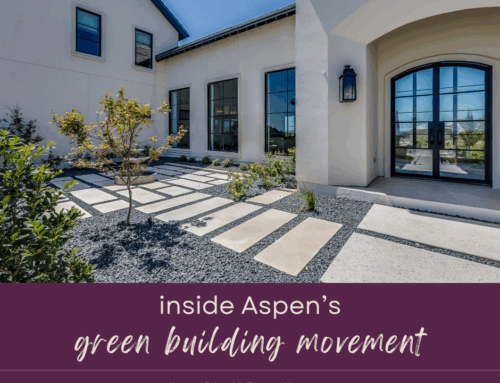Aspen is a unique real estate market where design, location, and environmental compatibility matter as much as square footage. Whether you’ve just purchased an older home or are rethinking the one you’ve owned for years, you may be debating between a renovation and a complete rebuild. Each option offers distinct benefits and challenges, and the right choice depends on your timeline, budget, and long-term plans.
Should You Renovate or Rebuild Your Aspen Property?
Making the right decision starts with understanding your goals—and the rules that apply. This guide explains the following:
-
Key factors that influence the decision to renovate or rebuild
-
Pros and cons of renovating in Aspen
-
Pros and cons of rebuilding in Aspen
-
Zoning, permitting, and environmental considerations
-
Tips for deciding what’s right for your property
Here’s a closer look at each.
Key Factors That Influence the Decision to Renovate or Rebuild
Start by assessing the existing structure. Does it have good bones, or will it require major changes to meet your needs? How much of the home is outdated or inefficient? In Aspen, things like layout, insulation, snow load capacity, and energy efficiency matter—not just style.
Consider these key questions:
-
Is the current home structurally sound?
-
Are the existing systems (HVAC, electrical, plumbing) in good condition?
-
Does the layout support modern living or luxury features?
-
Are there historic preservation restrictions?
-
Will zoning allow a larger or taller structure if you rebuild?
If the answers point toward major structural changes, a rebuild may be more cost-effective than a phased, high-cost renovation.
Pros and Cons of Renovating in Aspen
Pros of Renovating
-
Faster project timeline: Renovations usually take less time than new builds
-
Lower upfront cost: Remodeling can be more budget-friendly, especially if the structure is solid
-
Preserve charm: You can keep original architectural features that add character or value
-
Simpler permitting: In some cases, renovations don’t require the same extensive review as new construction
Cons of Renovating
-
Unexpected costs: Older homes may hide structural issues or outdated systems
-
Limited flexibility: Existing layouts, setbacks, and rooflines may restrict your options
-
Energy inefficiency: It can be harder to bring older homes up to current efficiency standards
-
Resale limitations: A renovated home may still fall short of what new construction buyers want
If your goal is to refresh your living space without fully starting over—and your home is in good shape—renovating can make sense.
Pros and Cons of Rebuilding in Aspen
Pros of Rebuilding
-
Full customization: You can design your ideal layout, features, and finishes
-
Improved efficiency: Build with the latest in smart tech and green materials
-
Modern compliance: Meet or exceed all current codes, energy standards, and design guidelines
-
Maximized value: New builds often command higher prices and greater appeal in resale
Cons of Rebuilding
-
Longer timeline: Full builds can take 18 to 36 months from permitting to completion
-
Higher cost: Construction costs are significant in Aspen—often $1,500 to $4,000 per square foot
-
More approvals required: You’ll need to work through Pitkin County zoning, permitting, and potentially the Growth Management Quota System (GMQS)
-
Temporary displacement: You may need to rent or live elsewhere during the process
For buyers who want a modern home tailored to Aspen’s climate, views, and lifestyle, rebuilding is often worth the time and investment.
Zoning, Permitting, and Environmental Considerations
Whether you renovate or rebuild, you’ll need to work within Aspen’s strict zoning and development codes. These cover:
-
Floor Area Ratio (FAR): Limits how much you can build based on lot size
-
Height restrictions: Usually capped around 25 to 35 feet, depending on zone
-
Setbacks: Required distances from property lines
-
Tree protection and grading limits: Designed to preserve the landscape
-
Solar access and snow storage rules: Especially important in winter
If you plan to tear down and rebuild, confirm whether your lot allows for additional square footage or structural changes. A rebuild could trigger stricter requirements, including GMQS review.
For guidance on zoning or land use planning, visit the Pitkin County Community Development Department.
Tips for Deciding What’s Right for Your Property
To make an informed decision, consider these tips:
-
Get a full home inspection: Understand the condition of your foundation, roof, systems, and structure
-
Meet with an architect: They can help you visualize what’s possible under current zoning
-
Work with a REALTOR®: A local expert can help you assess resale value, project feasibility, and neighborhood trends
-
Estimate costs early: Get contractor estimates for both renovation and new construction
-
Plan with the long term in mind: If this is your forever home, investing in a rebuild may bring greater satisfaction and ROI
In some cases, a partial tear-down and expansion might offer a middle path, preserving parts of the structure while modernizing the rest.
FAQ About Renovating vs. Rebuilding in Aspen
Check out these commonly asked questions about improving luxury homes in Aspen. If you don’t see your question here, please call our office and we’ll find you the answers you need.
Is It Cheaper to Renovate or Rebuild?
Renovating is usually cheaper upfront, but costs can rise if the structure has hidden issues. Rebuilding costs more but gives you full control and modern design.
Can I Expand the Size of My Home If I Rebuild?
Possibly, but it depends on zoning, setbacks, and the floor area ratio for your lot. A local architect or REALTOR® can help determine your limits.
How Long Does a Rebuild Take in Aspen?
Most rebuilds take 18 to 36 months, factoring in design, permitting, and construction. Start planning early if you’re aiming for a specific season.
Do I Need Permits for a Major Renovation?
Yes. Most renovations involving structure, electrical, plumbing, or exterior changes require permits from the city or county.
What Is GMQS and How Does It Affect Rebuilding?
GMQS stands for Growth Management Quota System. It limits new square footage annually in Pitkin County and may apply to rebuilds over certain sizes.
Whether you choose to renovate or rebuild, Aspen’s luxury real estate market rewards thoughtful design, high-quality construction, and environmental awareness. With the right team in place—including a REALTOR® familiar with zoning, value, and buyer trends—you can make a confident decision that fits your vision and your long-term goals.
Get a FREE CMA on your home in 24hrs or less!
It's a SELLERS Market! Even if you are even just THINKING about selling, knowing what your home's TRUE market value is valuable information. Fill in your info below and we will send you a complete Market Value Report that shows you what it is REALLY worth in today's market.
Are You Selling or Buying a Home in Aspen?
If you’re ready to sell your home in Aspen, Woody Creek, Basalt, Carbondale or Snowmass, we may be able to help you.
Get in touch with us right now to find out how much your home is worth – and discover how we’ll be able to help you sell it quickly and for top dollar.
If you’re also looking for a home for sale in Aspen or a nearby community, check out our listings by price in the table below.
Aspen Homes for Sale by Price
| $200k to $300k | $300k to $400k | $400k to $500k |
| $500k to $600k | $600k to $700k | $700k to $800k |
| $800k to $900k | $900k to $1 million | Over $1 million |

























